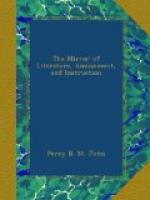When Araspes had commended the fair Panthea to Cyrus, as a beauty worthy his admiration, he replied—“For that very reason I will not see her, lest if by thy persuasion I should see her but once, she herself might persuade me to see her often, and spend more time with her than would be for the advantage of my own affairs.”—Alexander the Great would not trust his eyes in the presence of the beauteous Queen of Persia, but kept himself out of the reach of her charms, and treated only with her aged mother. These, as they were peculiar acts of continence, so were they as absolutely checks of curiosity, which never sleeps in youthful breasts when beauty elicits admiration.
Cicero, treating of the many degrees of human commerce and society, places matrimony in the first rank. In fact, marriage is not only a state capable of the highest human felicity, but it is an institution well calculated to destroy those rank and noxious weeds of the passions which, by their pestiferous influence, spread misery and death around the social hemisphere. Marriage is the basis of community, and the cement of society;—it is, or ought to be, that state of perfect friendship in which there are, according to Pythagoras, “two bodies with but one soul.” It is in the genial atmosphere of this noble communion of sentiment and affection that the virtue of continence comes forth in all its dazzling splendour. Milton has touched this subject with so chaste and elegant a pen, that the description, one would think, must confirm the husband in his happiness, and reclaim the man of profligate and licentious principles:—
“Hail, wedded love! mysterious law!
true source
Of human offspring, sole propriety
In Paradise, of all things common else.
By thee adultrous lust was driven from
men,
Among the beastial herds to range; by
thee,
Founded in reason, loyal, just, and pure,
Relations dear, and all the charities
Of father, son, and brother, first were
known.
Perpetual fountain of domestic sweets,
Whose bed is undefiled and chaste pronounc’d,
Present or past, as saints or patriarchs
us’d.
Here Love his golden shafts employs; here
lights
His constant lamp, and waves his purple
wings:
Reigns here, and revels not in the bought
smile
Of harlots, loveless, joyless, unendear’d,
Casual fruition; nor in court amours,
Mix’d dance, or wanton mask, or
midnight ball;
Or serenade, which the starv’d lover
sings
To his proud fair, best quitted with disdain.”
J.P.
* * * * *




